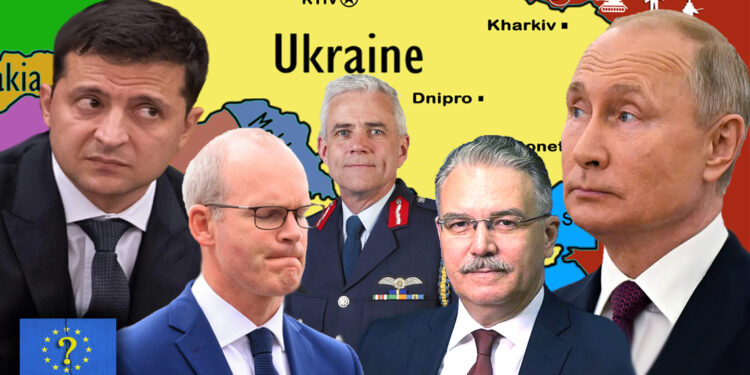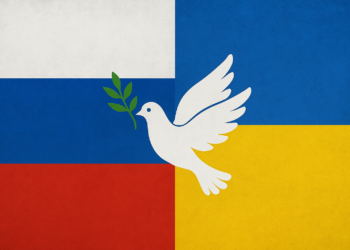by Miceál O’Hurley
Upon further information, Diplomacy in Ireland – European Diplomat has issued the following clarification.
DUBLIN – If the old adage a ‘picture paints a thousand words’ is true, Ireland gave proof to it and the words were dismay, disbelief, disgust and disenchantment (amongst others not appropriate to be repeated for publication). A photograph released by the Russian Embassy Twitter account Friday sent shockwaves throughout Europe’s diplomatic community underscoring Putin’s knack for pitting international partners against each other to Russia’s benefit. The Twitter post captured for posterity a meeting between Irish Defense Forces Chief of Staff, Lieutenant General Seán Clancy, the Russian Military Attaché in Dublin and the Russian Federation Ambassador to Ireland, His Excellency Yuriy Filatov. The picture was taken at the Russian Embassy.
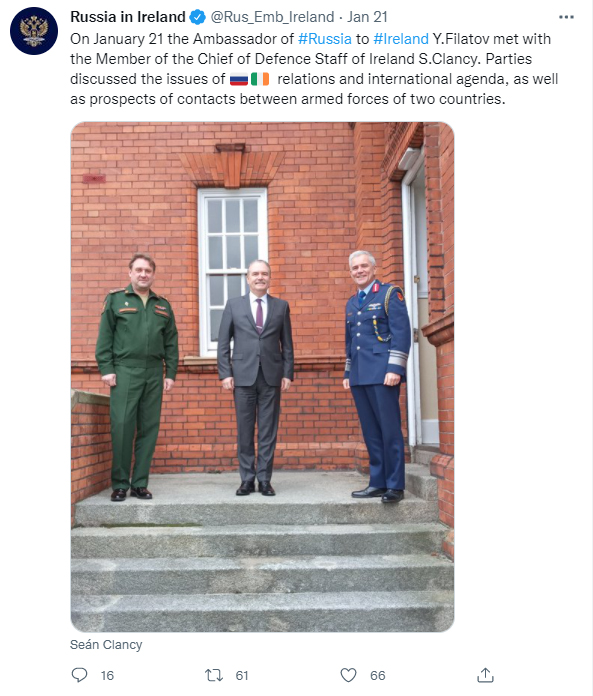
The meeting might have been considered routine had it not been for the confluence of three major events:
- Ireland having ordered the cessation of construction at that very Russian Embassy as it was deemed “… likely to be harmful to the security and defence of the State and the State’s relations with other states“;
- Ireland having voted repeatedly to sanction Russia in the EU and at the UN for its two previous invasions and occupations in Ukraine with even more Russian troops now staged and threatening a third invasion of Ukraine at present; and,
- Russia notifying Ireland it planned to conduct live-fire missile drills off of the Cork coast beginning next week.
Ill-Timed or Purposeful?
The photograph may not have the traction to become as equally infamous as that moment in history when Europe last stood on the brink of war in which the smiling Duke of Windsor (former King of England) visited Hitler at Berchtesgaden. Nevertheless, it immediately engendered like feelings of betrayal and mistrust in a Europe working feverishly to deter Russia from furthering its 6-previous-invasions of their European neighbours’ territory since World War II. Russia has used military force to illegally occupy:
- Moldova’s Transdniestria region;
- Georgia’s South Ossetia region;
- Georgia’s Abkhazia region;
- Ukraine’s Crimea peninsula;
- Ukraine’s Luhansk Region; and,
- Ukraine’s Donetsk region
Russia has currently laid the groundwork for its 7th invasion and occupation in Europe. Analysts agree that the Kremlin views the half-measures enacted against it for its previous offenses against international law and accompanying human rights abuses as mere inconveniences to be endured, falling far short of deterrence. As long as the benefits of invasion and occupation outweigh the costs Russia will repeat this page from their playbook. As Daniel Patrick Moynihan keenly observed and published in 1965, “Whatever you subsidize you will get more of it“. By failing to adequately deter Russia by half-measures and making Russia pay a high-cost for their aggression in Moldova, Georgia and Ukraine the West has subsidised Russian expansion and unsurprisingly, we not have more of it. This is also true Germany’s efforts over the past few days to deny Ukraine’s access to German-made weapons purchased by Baltic States that keep Ukraine unnecessarily vulnerable to Russian forces. History will judge Europe harshly for keeping Ukraine, Georgia and Moldova at arms length and failing to bring them in to the fold, dangling them like pawns to be traded for benefit in its never-ending game of Chess with Russia.
The photo opportunity was not the routine picture of two parties meeting to reduce tensions in Europe in the hopes of avoiding war but one which the Russian Embassy described the dialogue as the,
“… Parties discussed the issues of [Russian-Irish] relations and international agenda, as well as prospects of contacts between armed forces of the two countries”.
If a meeting between Ireland’s head of Defense Forces and the Russian Federation Ambassador was simply ill-timed or advised it would indicate a disconcerting level of naiveté on the part of the Irish Government. Russia’s history of aggression against fellow European States by invasion, occupation and a relentless campaign of hybrid-warfare designed to destabilise Europe is well documented. Ireland has decried it publicly. Russia’s equally legendary campaign t eliminate its individual critics s by poisonings, murder, helping force down an Irish civilian airliner with the ruse of a bomb threat to arrest a dissenting journalist or assassinating a dissident in a German are universally notorious.
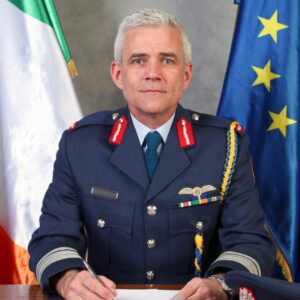
It begs credulity that such a catalogue of miscreant conduct on the part of Russia was alternatively unknown or ignored when the meeting was scheduled. It is more difficult to believe it was not postponed given the current threat level Russia has caused across Europe. By all accounts, General Clancy is a highly-respected, seasoned professional known for his good judgment, intellect and capabilities. It is hard to imagine such a leader unwittingly falling prey to attending such a meeting then being photographed smiling at its conclusion while Europe is at the precipice of war.
Any meeting in which Ireland-Russia met to discuss enhancing the contacts between Irish-Russian armed forces at present must be seen as deliberate, considered and purposeful. What purpose it might have served other than to appear to capitulate to Russia’s will for European disunity has yet to be elaborated upon by either the Departments of Foreign Affairs or Defense. What is known, however, is that it served to bolster Russia and undermine European unity while Russia threatens yet another invasion and occupation in Europe.
There is one take-away. Ireland has exposed its lack of development as a mature player on the international stage with an understanding of its moral and legal obligations to uphold a rules-based world order. Although it is not uncommon for the Chief of Staff to engage with foreign nations Embassies, sending a General instead of a seasoned diplomat to parlay with a capable veteran player like Ambassador Filatov to discuss Russian-Irish armed forces collaboration at this time has proven as big a folly as it was a policy misstep. While Ireland will undoubtedly try to ‘walk it back‘, that they will undoubtedly make the attempt is in itself an admission of the unforced-error. Trust has been eroded at a critical time.
Ireland Declines to Clarify Russian Embassy Statement and Photograph
An email asking for comment from the Department of Foreign Affairs about the Chief of Staff engaging in bilateral relations dialogue and the international agenda with the Russian Ambassador, and questioning if the discussion of developing closer contacts between the Russian and Irish armed forces was on the agenda at a time when growing Russian combat forces are marshalling along Ukraine’s border. The question remains did the meeting represent a change in policy undertaken with the knowledge and direction of the Minister for Foreign Affairs or not. The question was re-directed to the Defense Forces Press Office. A telephone request from Diplomacy in Ireland – European Diplomat asking for comment by the Defense Forces was returned at 1539hrs asking for a written request. The written request was not answered at the time of publication some 18-hours later, despite a SMS follow-up. I’m certain some young solicitor has advised the Government of the legal axiom, Qui tacet consentire videtur (silence equals consent).
Russia Has Proven an Existential Threat to Europe, Our Values and Way of Life
One of the follies of conventional ‘wisdom’ under which too many languish is that the current crisis is simply a conflict between Ukraine and Russia. It is not.
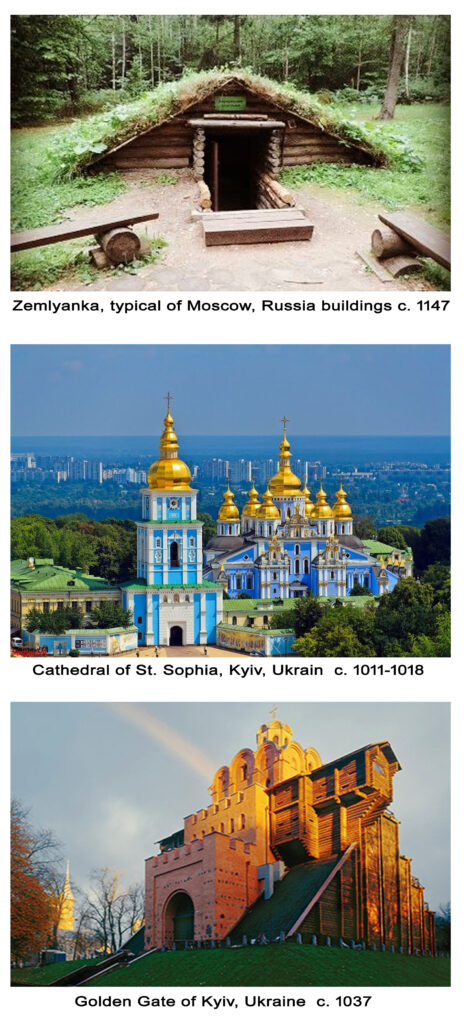
As Ukraine is not an EU member, the hoi polloi seemingly are unaware that Ukraine existed as an advanced, independent and developed nation-State, enjoying full diplomatic relations with the Byzantine Empire long before many modern European States existed in thought or reality. Indeed, when Anne, the daughter of Urkaine’s Grand Prince of Kyiva, Yaraslov the Wise (c. 978-1054), married the French King she was the only literate person in the entire French court. The same was true as well for his daughter Anastasia who became the Queen of Hungary. Moscow, which wasn’t even mentioned in the historical record until 1147, was by contrast a mere collection of Zemlyanka (mud-huts) on an inhospitable river to the north of Kyiv when the skyscraper-high dome of St. Sophia in Kyiv (c. 1011-1018) and other buildings such as Kyiv’s preserved ‘Golden Gate’ were as renown as the Ukrainian artwork, literature and culture already ensconced as the envy of European courts.
Falling into the Russian propaganda trap of thinking that Russia’s various invasions and occupations of Ukraine in the last two centuries make Ukraine a Russian possession or territory is as absurd as thinking any European diplomat, leader or parliamentarian would claim Latvia, Estonia, Lithuania, Sweden, Norway, Poland and other lands belong to Russia. We must move beyond this ridiculous assertion and recognise all of Ukraine and her people are free, independent and have the right of self-determination and the benefit or the protections of international law. There is a reason Russia spends inordinate resources attempting to keep map-makers, Google, Apple, governments and news organisations using the Russian word ‘Kiev‘ for Ukraine’s capital as the city, properly known as Kyiv, takes its name from the legendary Kyi, the eldest of three brothers that founded the city of Kyiv proving both Ukraine and Kyiv pre-date Russia and the Russification of the city’s name. Anyone who clings to the Russified ‘Kiev‘ simply plays into Russian colonial-imperial propaganda machine turned-out by Putin inferring the belongs to them. Ukraine’s capital is Kyiv, a free, independent and sovereign nation that is decidedly not Russian.
Any talk in Europe that Ukraine’s borders need not be restored or that Ukraine belongs to Russia in any manner, physically, culturally, socially or historically only acts to fundamentally refute the very values and ideas upon which the European Union was founded. Either the values are universal and indelible or they are worthless. Russia cannot be allowed to change the inherent ideas of European life and existence by use of threat or force. If it is allowed to do so, it might be Ukraine that is sacrificed through a death-by-a-thousand cuts today, but Finland, Poland, Bulgaria, Slovenia, Romania and the European Union would be sacrificed on the chopping block tomorrow. Defending Ukraine is an existential matter for Europe, freedom and democracy.
It may well be worth noting that when the young, peaceful protesters who were brutally gunned-down by orders of the Pro-Russian Ukrainian President, Viktor Yanukovich, acting on Moscow’s instructions to quell the democratic will of the Ukrainian people’s determination to enshrine Ukraine’s future in the EU by parliamentary-approved legislation, many died wrapped in the EU flag. Ukraine is undeniably European by nature and geography, but to my knowledge, Ukrainians remain the only people in Europe that have given their lives not just for the EU flag but for the indelible ideas for which it stands. If Europe allows Ukraine to be invaded again, or accepts Russia’s attempts to keep Ukraine partitioned, and fail to restore its sovereign borders, the very values, ideas, concepts, laws and experiments upon which the EU experiment was founded will be rendered hollow and meaningless forever.
Of all nations that understand the evils of partition, and how it turns its own people against each other, promotes bloodshed, hatred and sews generations of division, Ireland is that country. Any support whatsoever, real or implied, for the continued partition of Moldova, Georgia or Ukraine, or countenancing any further partition of Ukraine, should be anathema to the Irish Government, its people, our heritage and culture. Ireland’s moral rectitude is being weighed and should not be found wanting.
Make no mistake about it, Putin’s issue isn’t with Ukraine as he would have you believe. Putin’s issue is with yet another functional democracy with European values thriving on his border. The threat of Russian’s seeing yet again that authoritarianism doesn’t work and that Europe offers a superior way of life, based in the rule of law, respect for human values, freedom, democracy and free speech is too much for Putin to contain domestically. Ireland must now decide who she truly is as a nation – a stalwart ally of freedom, democracy, European values and self-determination or a nation that betrays those values out of a misguided sense of fair play which is nothing short of appeasement.
Ireland’s Habit of Divorcing Neutrality, Legality and Morality
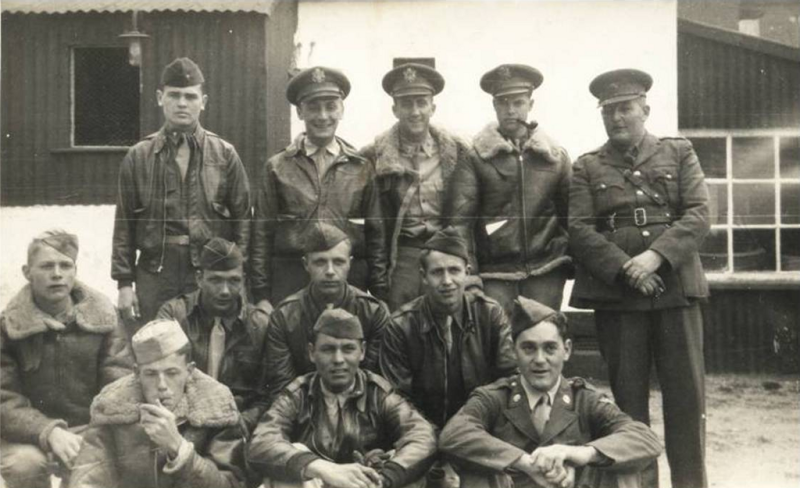
Ireland has always grappled with its stance as a neutral State. In World War II, the Government of Eamon De Valera was notorious for interning German bomber crews that crashed or landed in Ireland while allowing American and British pilots to cross the border into Northern Ireland to rejoin the fighting. Irish weather stations were critical in the pre-invasion analysis that allowed D-Day to be successful. And, in one demonstration of ‘neutrality’ so absurdly ludicrous that for some reason it has escaped Hollywood’s big screen, in April 1943, a B-17 bomber ditched on White’s Marsh in the townland of Garrnagoleen, near the town of Clonakilty, Co. Cork.
The Irish Army ‘secured the perimeter’ of the downed bomber while the locals conveyed the crew to Donovan’s Hotel where a 3-day party reportedly ensued in the pub all while the community pitched-in to build a makeshift runway under the noses of the ‘neutral‘ Irish Forces. Despite the Irish Army ‘guard’, the B-17 and its crew flew-off to return to the fighting to avoid ‘being bothered’ with interment before routinely being ‘allowed by the Irish State to wander away’ to Allied territory in Northern Ireland. Ireland knows how to push the bounds of neutrality on the side of a morally good cause – when it wants to. Resorting to moral acrobatics in a vain attempt to look ‘fair’ makes Friday’s high-level meeting with Russia all the more worrisome.
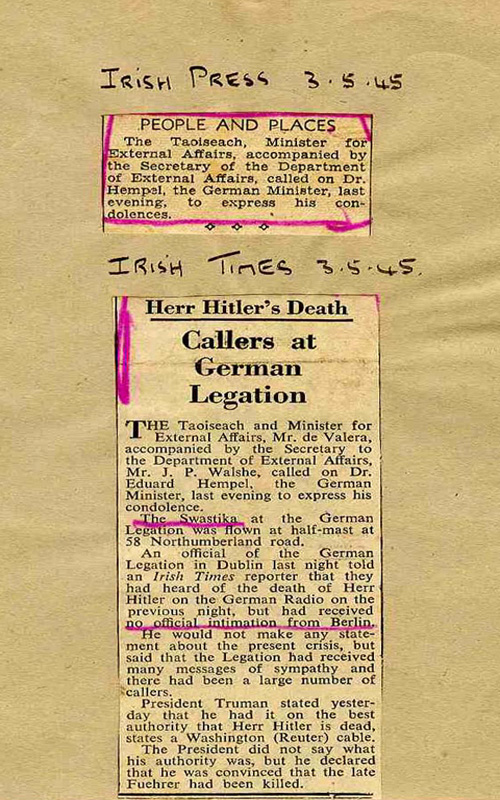
In an ever more disgraceful attempt to show Ireland’s even-handedness as a neutral State, De Valera personally visited to the German Embassy in Dublin to sign the book of condolences on the death of Hitler. His feeble attempt to explain it away as a simple ‘courtesy shown upon the death of any Head of State‘ echo in the annals of moral bankruptcy and apologetics for villains of the period. At the time De Valera visited Nazi Germany’s Ambassador to Ireland, Herr Hempel, the world was more than aware that Hitler and Stalin had conspired to divide Europe into sphere’s of influence, beginning with the destruction of Poland and the litany of human rights atrocities committed by German forces.
De Valera was acutely aware of the extent of the Holocaust from news reports and private briefings given to him by the same Vatican envoys who were already making plans for the ‘rat lines’ that would see infamous Nazi strongmen like Otto Skorzeny, Albert Folens and Helmut Clissman live openly in Ireland with De Valera’s permission all while Jewish refugees, mostly children, were denied admission based largely upon the ruthlessly anti-Semitic maiden speech of Oliver Flanagan without objection by any member of the Dáil. In his tome, The Emergency: Neutral Ireland 1939-45, Brian Girvan observed, “… Irish officialdom remained narrowly focused on a legalistic view of the war that seemed to lack any real sense of moral outrage at the revelations of war crimes”.
General Clancy’s meeting with Ambassador Filatov on Friday to discuss Irish-Russian armed forces cooperation, all while Russia has what European High Commissioner Josep Borrell called “a gun to Ukraine’s head, threatening all of Europe” gives rise to valid criticism that Ireland still fails to demonstrate moral courage and good character when the rule of law and survival of nations are at-stake. This warped view of ‘neutrality’ as an excuse for facilitating despot regimes that threaten and actually destabilise Europe at the expense of thousands of human lives is indefensible. The European Experiment in democracy, values and stability surely cannot be sustained with such indifference to the rule of law flowing from a faulty moral compass.
What is Ireland’s Position?
As late as 2019, Government rejected legislation designed to enshrine Irish Neutrality into the Constitution. During the debate Minister Simon Coveney lashed out to opponents that the EU was not “some kind of war monger. It is the absolute opposite of that… the EU is born of a vision to end wars… neutrality isn’t about inactivity of or excluding oneself from difficult situations. It’s about being proactive but not aligned” to any military grouping. Such an insightful statement stands diametrically opposed to General Clancy discussing enhanced Irish-Russian military contacts at a time given Russia’s daily-growing threat to wipe more of a free and independent European democracy from the map.
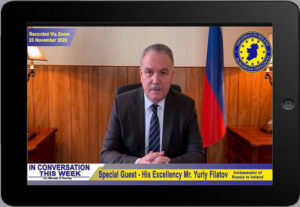
The presence of General Clancy at the Russian Embassy, at this time, cannot avoid but being seen as a notch-in-the-belt the Russian Foreign Ministry. Ambassador Filatov has proven himself, yet again, a masterful representative of the Kremlin. With Russia announcing and characterizing the meeting’s agenda with the accompanying staged photo creates the impression that Russia is the master and the bilateral relationship is not one of equals or equal respect.
Without Coveney or Clancy releasing any clarifications, and allowing the Russian description of the dialogue to stand, it is perceived in diplomatic circles as being correct. Subsequent discussions with diplomats and security analysts across Europe by Diplomacy in Ireland – European Diplomat in the aftermath of Russia’s Tweet indicated the ‘wisdom’ of such engagement by Ireland universally escapes logic and invited disdain.
Russia’s Self-Created Status as an Aggressor State is Well Known
Russia’s ongoing illegal conduct is well known to the world, including the Department of Foreign Affairs and the Chief of Staff of the Defense Forces. In the last couple of years alone (non exhaustive):
- 2006, Georgia’s Parliament approves bill to integrate with NATO to which Russia responds with illegal detentions and moving troops to threaten Georgia’s border, escalates illegal ‘passportisation‘ and increased illegal funding for Russian-backed terrorists in Georgia;
- 2007, Russia begins expanding territorial claims in Arctic Europe by planting a titanium flag on the seabed using submersibles;
- 2007, Russia unilaterally withdraws from the 1990 Treaty on Conventional Armed Forces in Europe;
- 2008, Russia invades and occupies parts of Georgia;
- 2014-2021, Ireland joined the UN in multiple votes condemning Russia for invading and occupying Ukraine;
- 2014-2021, Ireland consistently voted in the EU to sustain sanctions on Russia for its violations of international law;
- 2014, Russia shoots-down a civilian airliner, MH-17, over Ukrainian air space killing 298 civilians;
- 2017, Montenegro prosecutors released evidence Russia attempted to assassinate their Prime Minister;
- 2018, the United Kingdom identified Russian intelligence officers it wants for the poisoning of Sergei and Julia Skripal;
- 2018, the United Kingdom proved the murder of Dawn Sturgess in Salisbury was caused by Russian-made Novichok – a banned chemical weapon also linked to the Skripal poisonings;
- In 2019, despite the International Tribunal for the Law of the Sea (ITLOS) finding against Russia, it remains un-compliant with the judgment against them for having illegally seized Ukrainian crews and boats operating in their own waters and continues to create a threat to freedom of navigation in the Sea of Azov and Black Sea (an escalation of the Russian misconduct with Netherland’s Artic Sunrise also a loss for Russia at ITLOS);
- In 2018, Ireland expels Russian diplomats in concert with other European country based on evidence of Russian death-squad operating in England;
- 2019, Russia State agents violently execute a Georgian granted Refugee status in a Berlin park;
- 2020, Ireland is on record as decrying Russia’s poisoning and imprisonment of Russian civil society actor and opposition leader Alexei Navalny;
- Russia threatens Ukraine with summer invasion by positioning superior fighting forces on Ukraine’s border only to declare they would withdraw them without doing so;
- 2020, European Commission Report – Russia running disinformation campaign about Covid-19 Pandemic to undermine and destabilise Europe
- 2021, the Grand Chamber of the European Court of Human Rights (ECHR) found Russia exercised “effective control” over forces occupying Georgia, rendering Russia’s claim of innocence for murders, torture and political detentions absurd;
- Ireland condemned Russia’s support for the Syrian Regime using chemical weapons against civilians;
- 2021, a decision by the ECHR found that ex-KGB bodyguard Andrei Lugovoi and another Russian, Dmitry Kovtun, carried out assassination of Alexander Litvenenko in London on Russian Federation orders;
- 2021, NATO expels 8 Russian spies operating in its headquarters as ‘diplomats‘;
- 2021, Russia renews its threat to Ukraine by marshalling more than 100,000 combats troops on Ukraine’s border
- 2021, Russian Naval Vessels open fire on British Ship transiting through internationally recognised Ukrainian waters in Black Sea
- 2022, Russia demands Ukraine never be allowed to join NATO and NATO roll-back its membership to 1997 (expelling all former USSR members);
- 2022, Irish Defense Chief of Staff meets with Russian Ambassador in Dublin to discuss armed forces cooperation.
In a series of telephone interviews with European and UN diplomats, none of whom were authorised to speak publicly on these matters without further consultation with their Governments, each made clear the dangerous signal and mixed-messaging it sent to the world to have Ireland (which currently occupies a seat on the UN Security Council, and has previously been a supporter of sanctions against Russia for its previous invasions and occupation of Crimea and Donbas) discussing military cooperation with the Kremlin’s envoy in Dublin. As with De Valera, appearances are that Ireland still seems to lack the ability to contextualise the danger of meeting and being photographed with human rights abusers, invaders, occupiers and those that threaten European values, stability and security.
Meeting Came on After Russia Announced Military Exercises Off Cork Coast in Ireland’s Exclusive Economic Zone
The meeting and accompanying photograph came within 24-hours of Russia announcing snap naval drills will take place within Ireland’s Exclusive Economic Zone within the next two weeks. The staging of missile and live-fire drills by the Russian navy so close to Irish shores has been flagged as a brazen threat by Russia to remind Ireland that being separated from continental Europe by water, with the United Kingdom no longer part of the European Union and Ireland not being a member of NATO, the country is particularly vulnerable to persuasion by “gunboat diplomacy”.
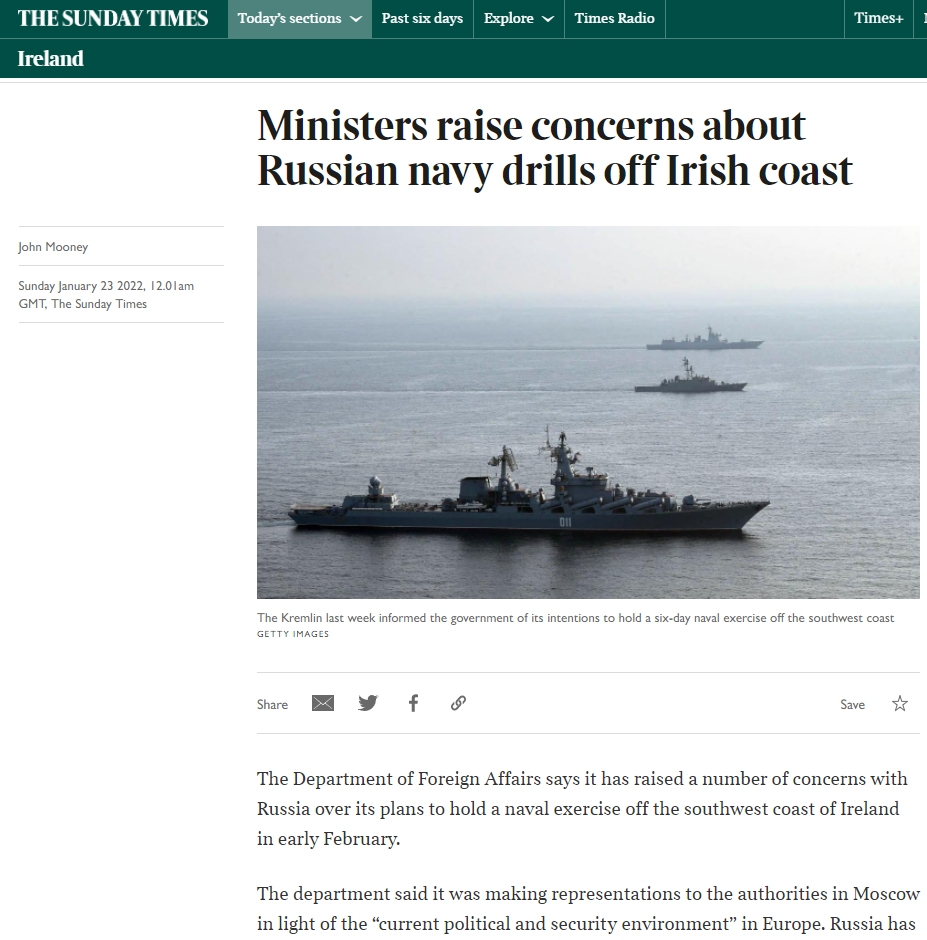
Russia’s State owned media outlet, Taas News Agency, reported on a statement by the Russian Defence Ministry that the naval exercises will commence at the end of January and conclude in February. These live-fire exercises are concomitantly scheduled in key waters that threaten Russia’s expansionist territorial and influence interests in the Mediterranean, North Sea, Sea of Okhotsk, the Atlantic and Pacific Oceans.
John Mooney, author and veteran reporter with The Sunday Times, published a very insightful, well researched and informative piece on the issue of Russian Navy drills about to take place off of the Cork coast. The column is well worth reading.
Russian Naval Exercises of Irish Coast Seen as Part of Global Warning to Western Democracies and Rule of Law
The staging of live-fire exercises off of the coast of Cork is not only unnecessary, as Russia can and usually conducts such exercises in its own waters, but is blatantly coordinated to send a message around the world that Russia intends to exercise its ‘global-military-reach’ that it once enjoyed before the demise of the failed Soviet Union. Russia has abandoned or breached arms treaties over the past few years to enhance its ability to threaten nation’s further from its borders. Last week, Russian Deputy Foreign Minister Sergei Ryabkov highlighted Russia’s ability to threaten the United States’ Eastern Seaboard with submarines capable of launching nuclear weapons, all while denying, somewhat akin to Don Corleone making someone an “offer they can’t refuse,” isn’t a “threat”. It is a threat and Russia knows it.
Kremlin’s Muscular Military Initiatives Coincide with Unreasoned Demands
In June 2021, Putin released an essay entitled “On the Historical Unity of Russians and Ukrainians”. By twisting history and ignoring facts, Putin claimed that former Soviet Republics, especially Ukraine, were truly Russian people and territories. This bogus claim has been recently reinforced by Russia’s demand for NATO to roll-back its membership to its 1997 ranks. Such a demand would not only deprive the organisation of its self-determination principles, but would send an ominous signal to the EU as well. Russia’s demand would necessitate NATO expelling former Soviet Republics and others including Albania, Bulgaria, Czechia, Croatia, Estonia, Hungry, Latvia, Lithuania, North Macedonia, Poland, Romania, Slovakia and Slovenia.
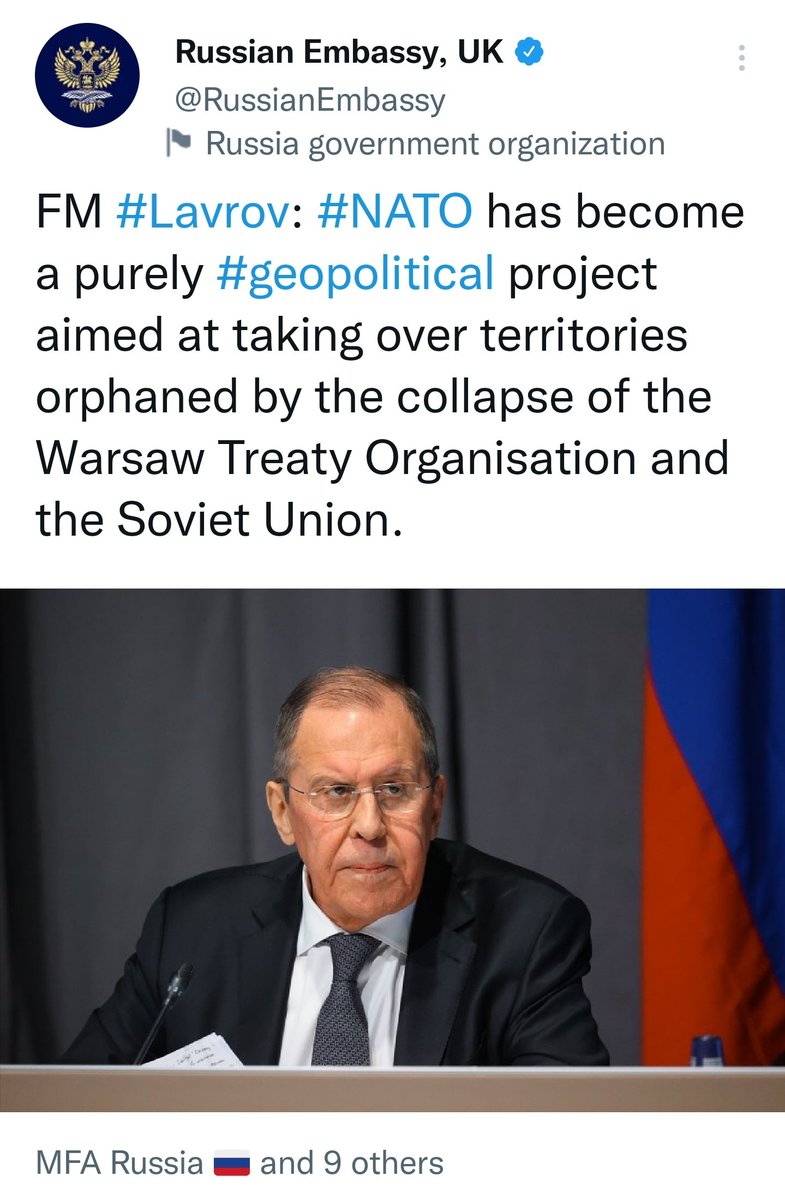
Only last week, Russia’s Foreign Minister, Sergei Lavrov, upped-the-ante calling former Soviet Republics, now independent sovereign States for more than 30-years, Russian “territories”. Moreover, Russia’s demand that NATO accept their Veto over membership for Ukraine, Georgia, Moldova and others, including Finland and Sweden, demonstrates that Putin is fully intent on engaging the world with a more aggressive diplomatic posture backed-up with overt muscular military threats.
Dáil Debate Proves Ireland Knows Better – History of Russian Navy Polluting Irish Waters
In an interview given to The Journal, Cathal Berry, TD, who previously served as a former Defence Forces Officer, said, “This is a range practice. This is what the great powers do, the exercise is posturing and is about messaging directly with European powers. The location is not an accident and has been entirely anticipated – they could be doing this off the coast of Murmansk but have chosen the Atlantic instead. There has been an increased number of incursions in to this area and near to Irish airspace. The concern from a military perspective is that an exercise is a very easy way to assemble large amounts of military assets into an area under false pretenses and be a precursor to other activities. It is not unprecedented, but it is unusual to see it so close to the Irish area of economic responsibility.”
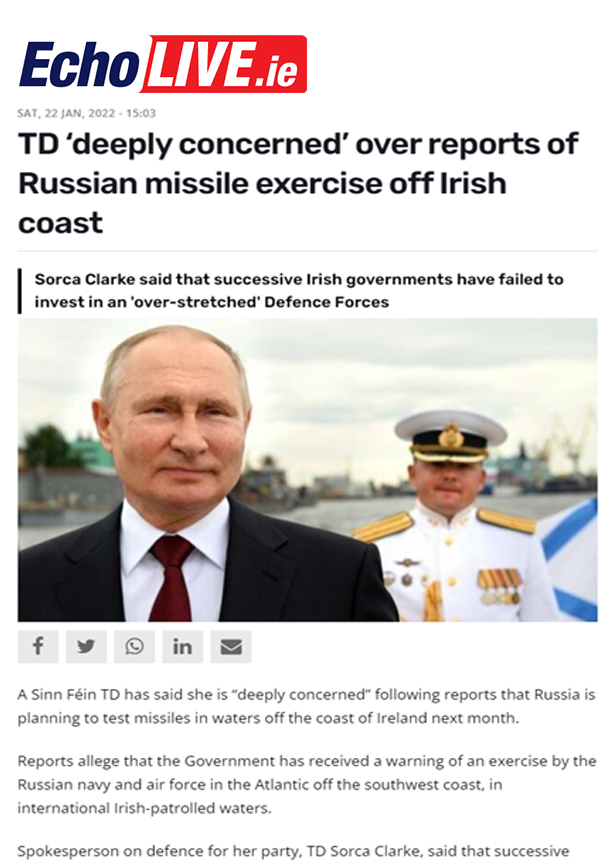
Russia is ever rounding the corners on the tables of normalcy until, without notice, the shape of the table has changed entirely to the surprise all but the constant observer. Deputy Berry’s observation that this could have taken place off Murmansk is worth noting. There is no reason for Russia to once again create an environmental disaster in Irish waters as they did in 2009 in similar circumstances, when they dumped massive amounts of oil into the sea.
Russia’s abject failure to notify Ireland of the oil spill, and their denial of responsibility until oil samples were demanded from the Russian Embassy for analysis some 10-days later, kept Ireland from effectively addressing the environmental disaster. Ireland is estimated to have ultimately spent in excess of €290,000 to address the environmental impact of the Russian military drills off the Irish coast. Unsurprisingly, the environmental community, fishermen, Councillors concerned about beaches and the EU have expressed both alarm and concern about the costs Ireland will be forced to pay for Russia’s ‘macho mansplaining of power‘ in Irish waters in lieu of diplomacy and adherence to international and human rights laws.
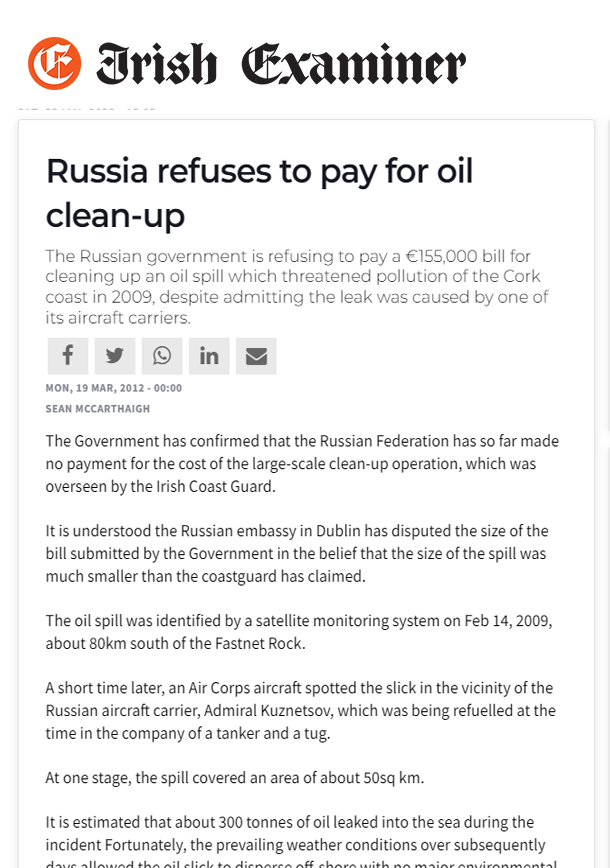
In their landmark paper, The Effects Of Modern War And Military Activities On Biodiversity And The Environment, a group of Canadian researchers published a comprehensive review of how activities like those to be undertaken by the Russian Navy off of the Cork coast have devastating environmental impact on aquatic and aviary life, water quality and often leave long-lasting debris that change marine habitats forever. According to the researchers, the carbon-footprint and environmental damage of creating, storing, shipping, transporting and expending the materials needed to support the operations of the type the Russian Navy will undertake in Irish waters is enormous.
Only last year, in April 2021, Russia Navy missile launch failures resulted in marine environmental damage with Putin’s vaunted ‘hypersonic rocket’ crashing into the sea in close proximity to the Russia ship that fired it. The resulting fire caused by the missile threatened the safety of the ship which would have made the environmental impact much greater. Environmentalists monitoring the test also sighted the visible oil leaks from the Russian Navy frigate Marshal Shaposhnikov which went un-treated. It is uncertain if the hypersonic missile ignited the oil spill trail or its own materials lit the water afire.
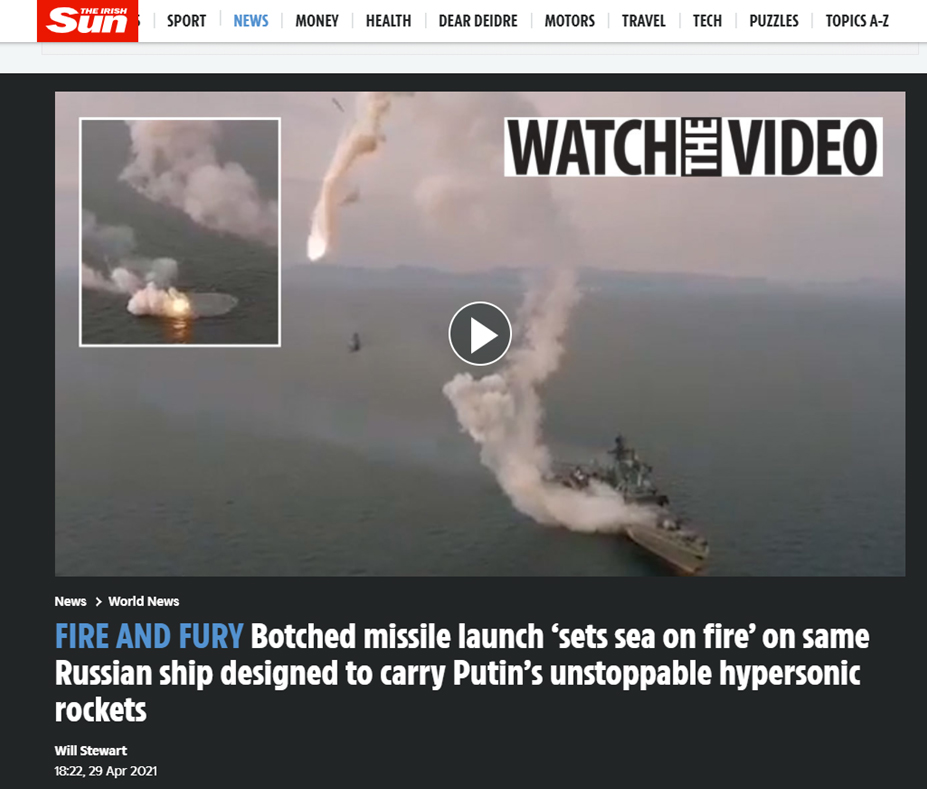
While UNCLOS does not specifically exclude such exercises in another State’s Exclusive Economic Zone, it remains unclear if the Department of Environment, Climate & Communications or the EU can hold Russia accountable for adverse environmental impact through treaties or bilateral agreements. Russia has not indicated if it intends to fire this this same or similar model of rocket off the Cork coastline. Neither has Russia announced if it will guarantee to prepare to speedily treat any further contamination of Irish waters or pay for any environmental damages such as the ones the Russian Navy tried to obfuscate yet failed to hide in the 2009 oil spill they caused in Irish waters.
The question well arises, ‘Why not conduct the exercises off Murmansk and threaten Russian marine life and damage their environment instead of Ireland’s unless the exercises are truly a political demonstration which necessitates them taking place in a way that changes Irish maritime and flight navigation and threatens our ability to fish our own waters with a sense of environmental safety’? The answer is clear – Russia wants to remind Ireland of its vulnerability and from the Tweet showing the Irish Defense Forces Chief of Staff smiling and discussing armed forces cooperation between Ireland-Russia. Fears are that Ireland got the Russian message ‘loud-and-clear‘ and chose to placate Russia even while alienating continental friends and closing its eyes to European values commitments.
































